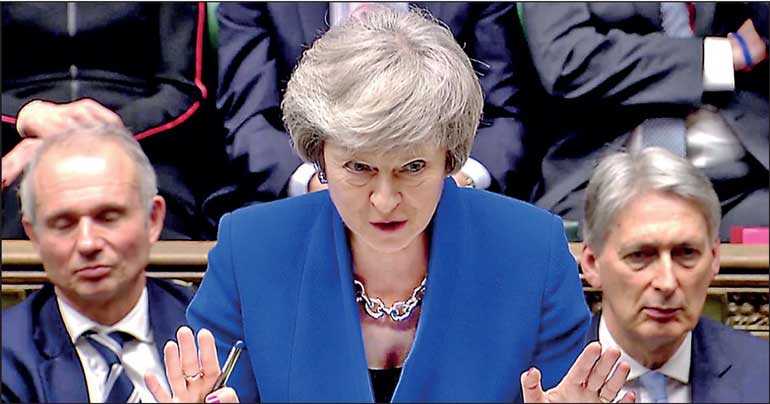Thursday Feb 26, 2026
Thursday Feb 26, 2026
Friday, 18 January 2019 00:00 - - {{hitsCtrl.values.hits}}

LONDON (Reuters): Business leaders in Britain and beyond warned on Wednesday of catastrophic job losses and chaos at ports if the country does not agree a European Union withdrawal, turning up the heat on politicians to deliver clarity.
A Brexit agreement that would have secured tariff-free trade and safeguarded just-in-time cross-border supply chains was rejected by lawmakers on Tuesday, leaving Britain at risk of leaving the bloc on 29 March without a framework.
From Channel Tunnel operator Eurotunnel to Scottish whisky distillers, firms called for urgent and decisive government action and warned of the consequences of a no-deal Brexit.
“Ford continues to view a no-deal exit as the least likely outcome given how damaging it would be, but we recognize the situation is highly uncertain after yesterday’s vote,” the US carmaker’s Chief Financial Officer Bob Shanks said.
“We are urging the U.K. government and parliament to work together to avoid the country leaving the EU on a no-deal, hard-Brexit basis ... Such a situation would be catastrophic for the UK auto industry and for Ford’s manufacturing operations in the country,” Shanks added.
Volkswagen said in an emailed response to a question about its plans that its UK business has made additional provision for the stocking of new vehicles at and close to its import centers and has also made increased provision for the stocking of parts.
Tailbacks
British Prime Minister Theresa May must now speak to senior parliamentarians to find a compromise that would avoid a no-deal Brexit or consider another referendum on EU membership.
The opposition Labour party’s finance minister-in-waiting, John McDonnell, said May could eventually get a deal through parliament if she negotiated a compromise with his party.
However, a disorderly Brexit would plunge Britain into recession for at least two years and lop a half percentage point off economic output for the rest of the EU, Deutsche Bank Chief Executive Christian Sewing said.
And freight and logistics firms predicted border chaos, with Jens Bjorn Andersen, head of Danish freight company DSV, saying customs checks on every truck crossing the English Channel could lead to 80 mile (130 km) tailbacks.
Dover handles 17% of the United Kingdom’s goods trade, with up to 10,000 trucks a day passing through with everything from food to medicines.
Logistics giant Deutsche Post said it had opened an office in the English port of Southampton and had 450 customs specialists advising clients in case of problems at Dover.
Without clarity on Britain’s next steps, it cannot put any of its contingency plans in place, Deutsche Post, which employs 54,000 people in Britain, said. “We are relying on a decision by the United Kingdom”.
Germany’s chemical and pharmaceutical industry association (VCI) called for interim solutions, in particular to ensure the supply of medicines.
“A disorderly Brexit would create such a complex situation that it is impossible for companies to prepare for all eventualities,” VCI Managing Director Utz Tillmann said.
Belgium’s Finance Minister told Belgian companies to step up their plans, with figures showing only one in five ready for the customs arrangements that could apply for trade with Britain.
LTO Nederland, representing Dutch farmers and agricultural producers who export goods worth more than eight billion euros ($9 billion) a year, said unhindered trade was crucial and called on the Dutch government to offer practical solutions.
Its members were discussing with customers and partners how best to prepare and “spread the pain over the chain”.
‘Cloud Cuckoo Land’
“Whether it be manufacturing, agriculture or services, across the piste we rely on trade. We don’t have a massive domestic economy. The reason a no-deal Brexit is so scary is because tariffs on everything are highly punitive under WTO (World Trade Organization) rules,” said Andrew Jackson, head of fixed income at fund manager Hermes Investment Management.
John Allan, President of the Confederation of British Industry and chairman of supermarket group Tesco, told BBC Radio that those thinking they could renegotiate EU trade relations from scratch were living in “cloud cuckoo land”.
Swiss ground services and cargo handling business Swissport Group said a disorderly Brexit could further tighten Britain’s labor market, which has already seen fewer EU candidates entering since the 2016 referendum, with a workforce shortage driving up labor costs in some parts by as much as 10 percent.
British share prices were spared heavy losses as analysts said the risks of further deadlock were already priced in and some bank stocks even gained slightly, suggesting optimism for a parliamentary compromise some investors such as David Roberts, co-manager on the Liontrust Strategic Bond fund, said.
“There is still a long way to go, but hopes of a mutually beneficial solution are growing,” he said.